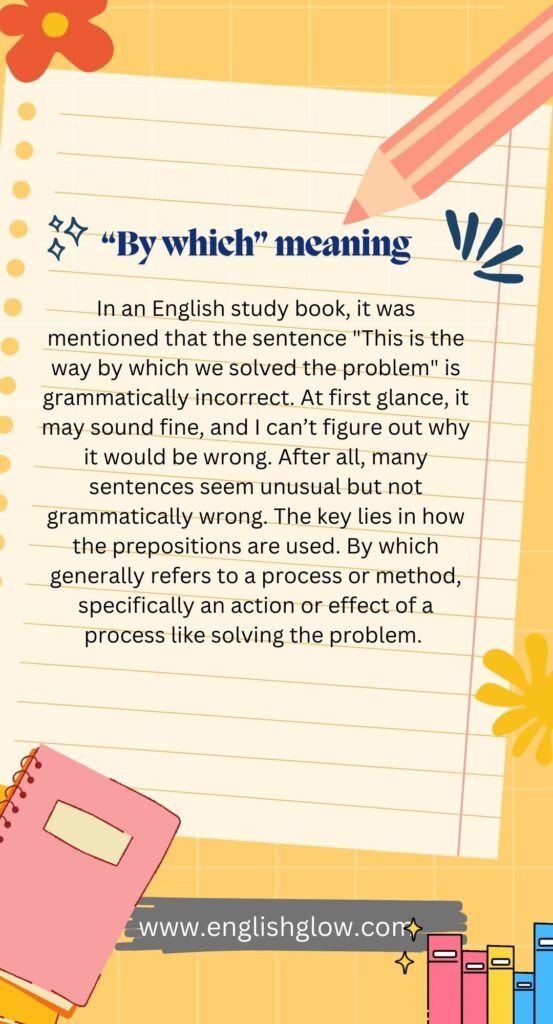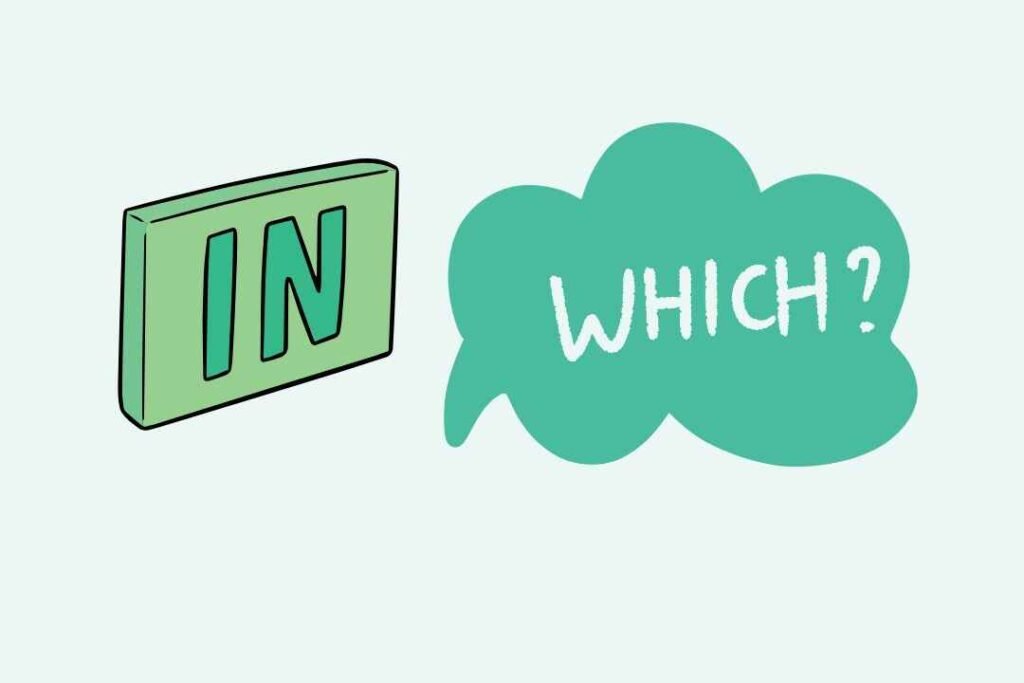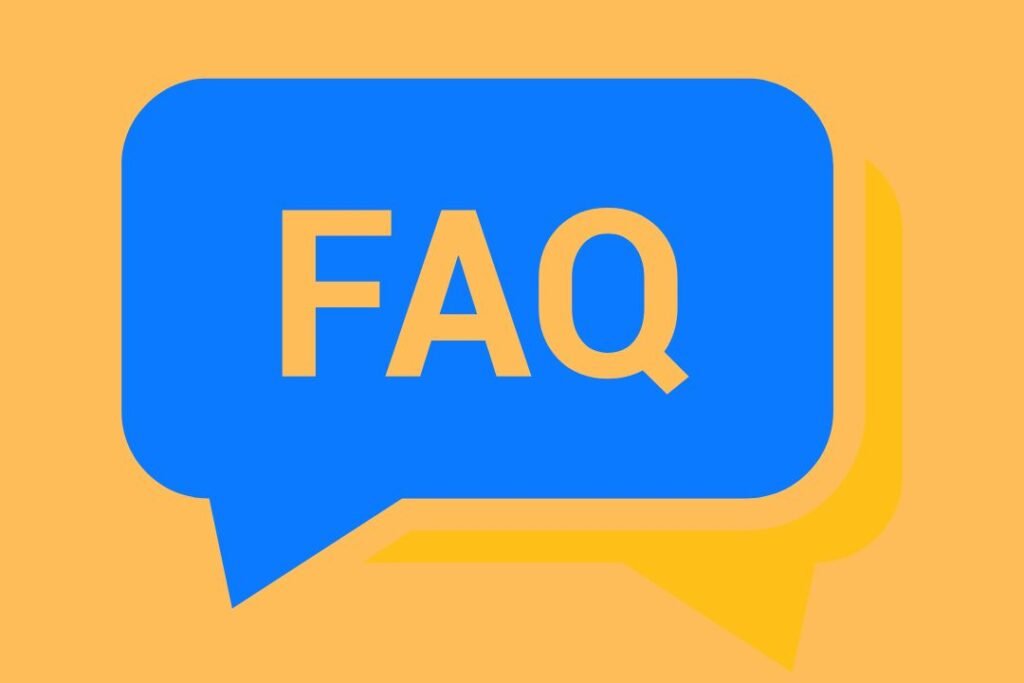When discussing phrases like “by which” and “in which,” it’s important to understand how they differ in meaning. By which is often used to describe the process or effect that happens as a result of something. For example, “Steeping is a process by which tea is made.” In this sentence, the focus is on the effect—the tea being made. On the other hand, it explains what happens during the process, like, “Steeping is a process in which water absorbs the flavor from tea leaves.” The difference might seem small, but the connotation can change the focus of a sentence.
This subtle change is important in cases where the subject or action being described can have multiple interpretations. In processes like Othering, a binary process between the colonizer and the colonized, using “by which” shows how the colonizer can affirm their identity through the process, while the colonized is considered as the other. This highlights the effect of the process on identities. If we say “in which,” we focus on the process itself—what is happening between the groups.
In many situations, there is an overlap between the two phrases, and both may be grammatically correct. However, using the correct phrase can ensure that the meaning of the sentence is clear. For example, when you say, “The event is a part in which many people participate,” it explains the involvement of people in the event. But if you say, “The event is a part by which people are influenced,” you emphasize the effect of the event on the participants. It’s always a good idea to choose the phrase that best matches what you want to say, depending on whether you’re explaining a process or its effect.
Example
- The ceremony is a process through which cultures are celebrated.
- The ceremony is a process in which individuals unite to share traditions.
You might enjoy reading: Mine as Well, Might as Well, or Mind as Well? Unravel the Truth
By which” meaning

In an English study book, it was mentioned that the sentence “This is the way by which we solved the problem” is grammatically incorrect. At first glance, it may sound fine, and I can’t figure out why it would be wrong. After all, many sentences seem unusual but not grammatically wrong. The key lies in how the prepositions are used. By which generally refers to a process or method, specifically an action or effect of a process like solving the problem. However, in most cases, using in which is more appropriate when referring to a way or manner.
For example, imagine a scenario where you solved a problem by doing a task. You would say, “We solved the problem by doing this,” because by fits with the action described. But when forming a relative clause with way, the sentence should be structured as “This is the way in which we solved the problem.” The reason is that “by this way” is not idiomatically correct in English, as it mixes prepositions in a confusing manner.
In which
The phrase “in which” is a useful and versatile construction in English, often used to refer to a specific place, time, or situation where something occurs. It functions as a relative pronoun, linking a noun to the action or state described in the sentence. For example, when referring to a location, one might say, “The house in which I grew up was torn down,” where “in which” indicates the place tied to the action of growing up. Similarly, “in which” can also be used to refer to a situation, such as in the sentence, “The project in which he was involved received widespread recognition,” linking the noun “project” to the specific context of involvement. In time-related contexts, “in which” helps specify the period when something happened, as in “The year in which they met was unforgettable,” emphasizing the time frame of the meeting. Additionally, “in which” is valuable for articulating abstract concepts, such as in “The theory in which we believe challenges conventional thinking,” where it links the theory to the belief. Using “in which” adds clarity and formality to your writing, providing a structured way to convey relationships between actions and their contexts.
The confusion between by which and in which can be cleared up by considering the regular word order. Take, for example, the sentence, “We solved the problem in this way.” This version clarifies the process without using the wrong preposition. English speakers might instinctively avoid using by which in this context because it doesn’t match the natural effect of solving the problem. Instead, when describing the method, the proper form is, “This is the way in which we solved the problem,” where the preposition connects to the manner of solving.
Explaination
A relatable example would be someone trying to reach you. Imagine saying, “I tried to call you but couldn’t reach you.” If you explain how you tried, you would say, “This is the method in which I called you.” Using by which here would not fit because it implies an action-driven result, not the manner of the attempt.
Another approach to better understand this difference is to break it down by processes. When we say, “This is the way we solved the problem,” it’s clear and concise, omitting unnecessary complexity like in which or by which. However, if you want to be more formal, in which provides a more precise connection between the method and the result. It’s important to note that by which typically works better when paired with -ing forms, such as, “We solved the problem by doing this.”
If we apply this to everyday language, a simple example would be: “I completed the project by following the steps, but this is the way in which I approached it.” The first part uses by to show the action, while the second part uses in which to highlight the method.
When in doubt, choose in which when referring to the manner or way something is done. As we discussed earlier, by which is more suitable for indicating a process or effect, especially when there is an action like solving, fixing, or improving. To illustrate, think of this sentence: “This is the way that we solved the problem.” Here, the more formal version would be:”This is the method by which we solved the problem.” The primary distinction lies in the level of formality and how the preposition connects the process to its outcome.
In summary, use in which to focus on the method, and reserve by which for specific actions tied to an ongoing process or effect.
you might enjoy reading: Was There or Were There? Unlock the Crucial Grammar Rule
FAQ
When should I use “which” or “in which”?
Use “which” to introduce a clause that adds additional information about a noun mentioned previously. “In which” is typically used when the noun is part of a prepositional phrase that needs to be specified or explained. For example:
- Which is used for options or clarification: “I have two books, which one do you want?”
- In which is used when referring to something within a situation: “This is the house in which I grew up.”
How do you use “by which” in a sentence?
“By which” is used to describe the method or means through which something happens. It explains how an action is performed. For example:
- “He devised a plan by which the project would succeed.”
- “The process by which the data was collected was very efficient.”
What is correct: “in what” or “in which”?
Both “in what” and “in which” can be correct, but they are used differently. Use “in what” when asking an open-ended question about a thing or a situation. Use “in which” when you’re referring back to a specific noun.
- In what is often used in direct questions: “In what situation would this be necessary?”
- In which is used to specify a particular instance: “He described the moment in which he made the decision.”
How do you use the word “in which”?
“In which” is used to introduce a clause that gives more information about a specific place, situation, or time. It functions like a relative clause to clarify the context of a noun. For example:
- “The book in which she wrote her notes was lost.”
- “This is the year in which we saw the greatest change in technology.
What is the difference between “by which” and “in which”?
“By which” typically refers to the means or method through which something happens or is achieved. It often indicates how an action is done.”In which” usually refers to the situation, place, or condition where something occurs or applies. It indicates a location or context.
When should I use “by which” in a sentence?
Use “by which” when you are describing the means, method, or process through which something happens. For example:
“This is the method by which the results are calculated.”
When should I use “in which” in a sentence?
Use “in which” when describing the situation, location, or condition where something occurs. For example:
“This is the situation in which they found themselves.”
Can you provide an example of “by which” in grammar usage?
Sure! Here’s an example:
“He developed a system by which information could be shared quickly.”
In this sentence, “by which” shows the means through which the system enables information sharing.
Can you provide an example of “in which” in grammar usage?
Example:
“The book describes a world in which magic is real.”
In this case, “in which” indicates the location or context where the story takes place.
Can “by which” and “in which” be used interchangeably?
No, they cannot be used interchangeably. “By which” refers to a method or means, while “in which” refers to a location or context. Mixing them up can change the meaning of the sentence entirely.How do I know when to use “by which” vs. “in which”?Think about what you are describing. If it’s a method or process, use “by which”. If it’s a situation or context, use “in which.”
Can “by which” or “in which” be used in questions?
Yes, both can be used in questions, depending on what you want to ask. For example:
“What is the process by which this is done?”
“What is the situation in which this rule applies?”
Is there a rule to help remember when to use “by which” and “in which”?
A simple rule is: “by which” = how something happens (the method), and “in which” = where or in what situation something happens (the context).
Can you give more examples with both “by which” and “in which”?
- “This is the principle by which we operate.” (method)
- “These are the circumstances in which the decision was made.” (context)
You might enjoy reading: Take Two and Call Me in the Morning: What They Don’t Tell You



